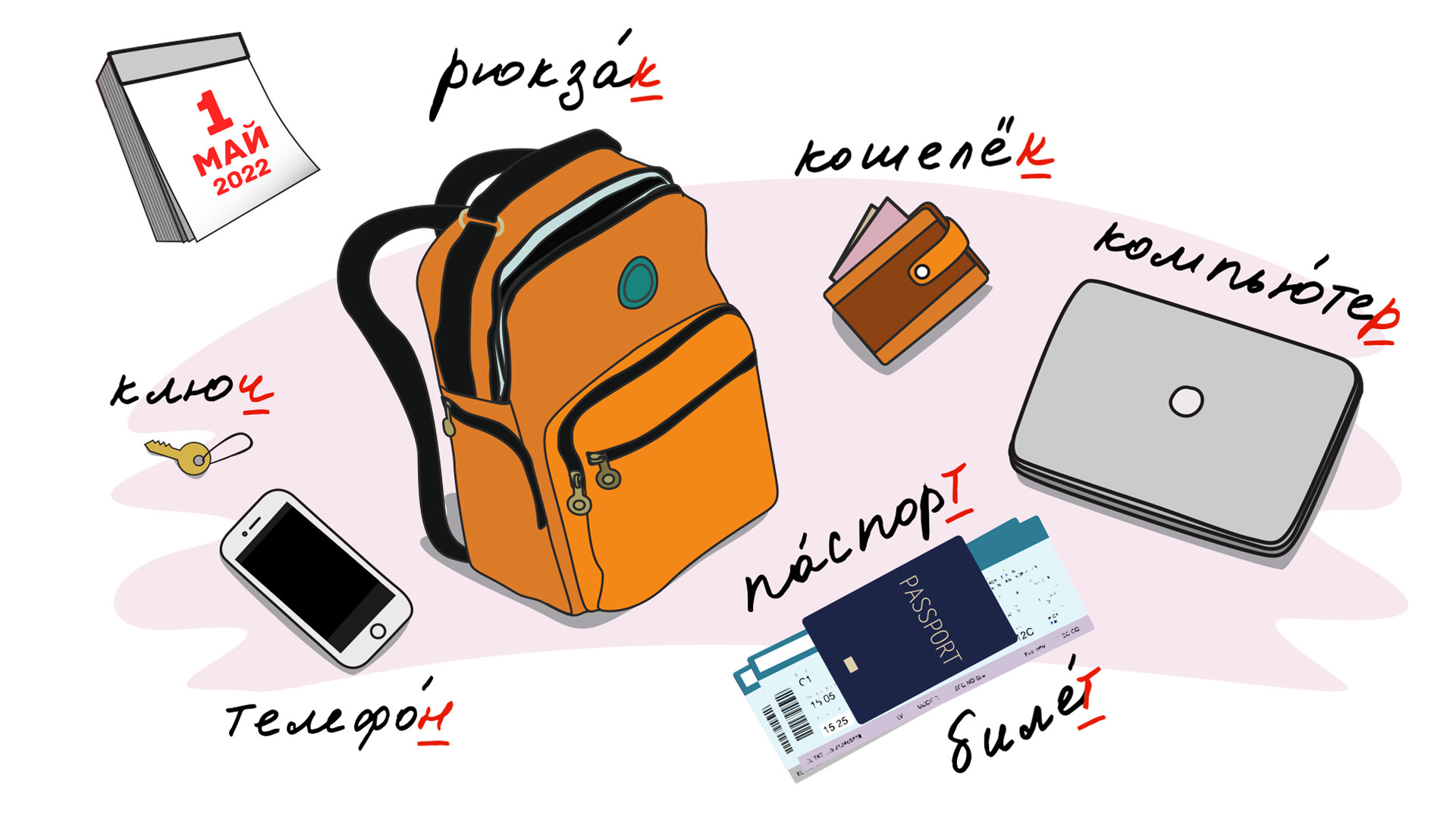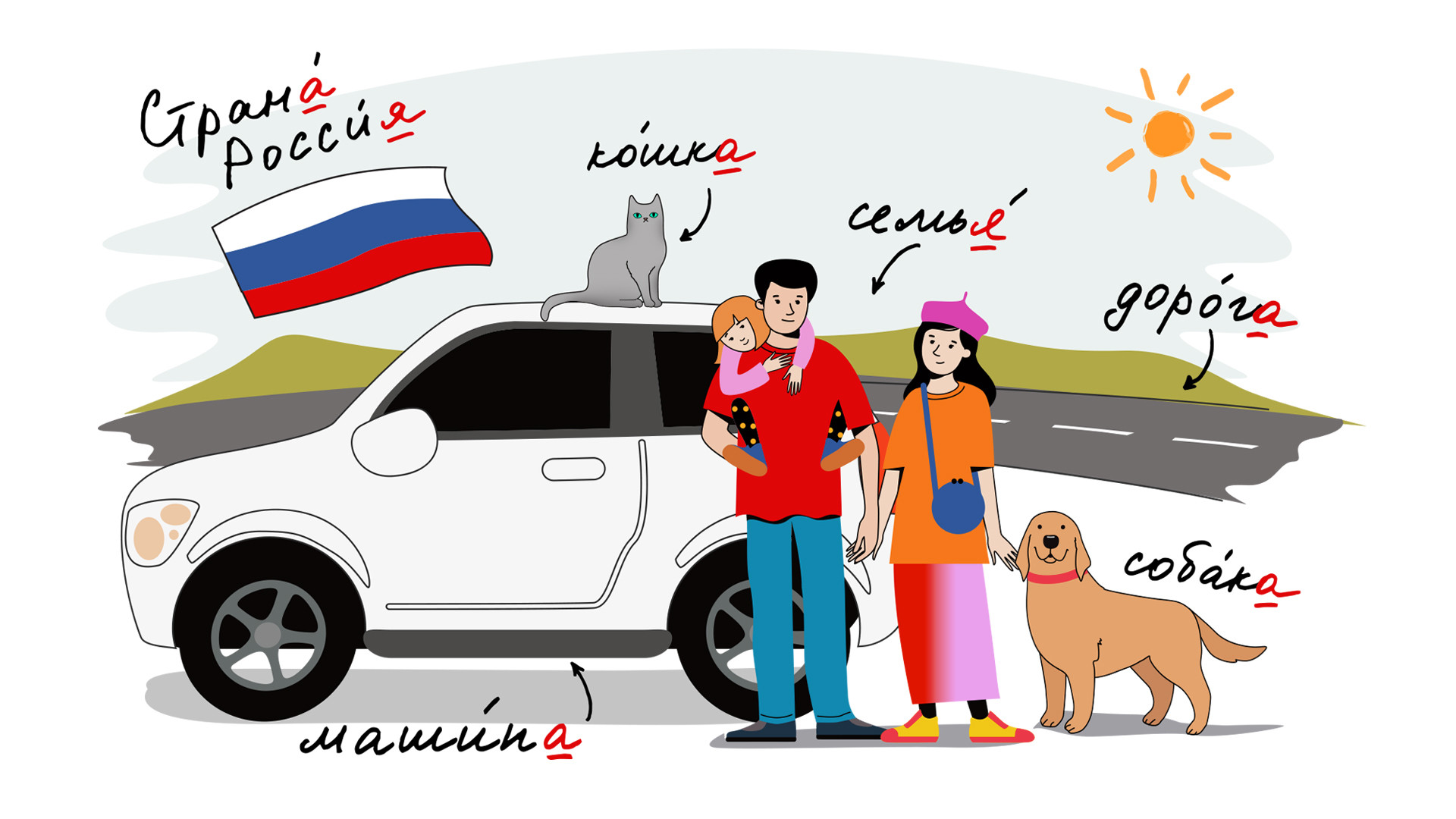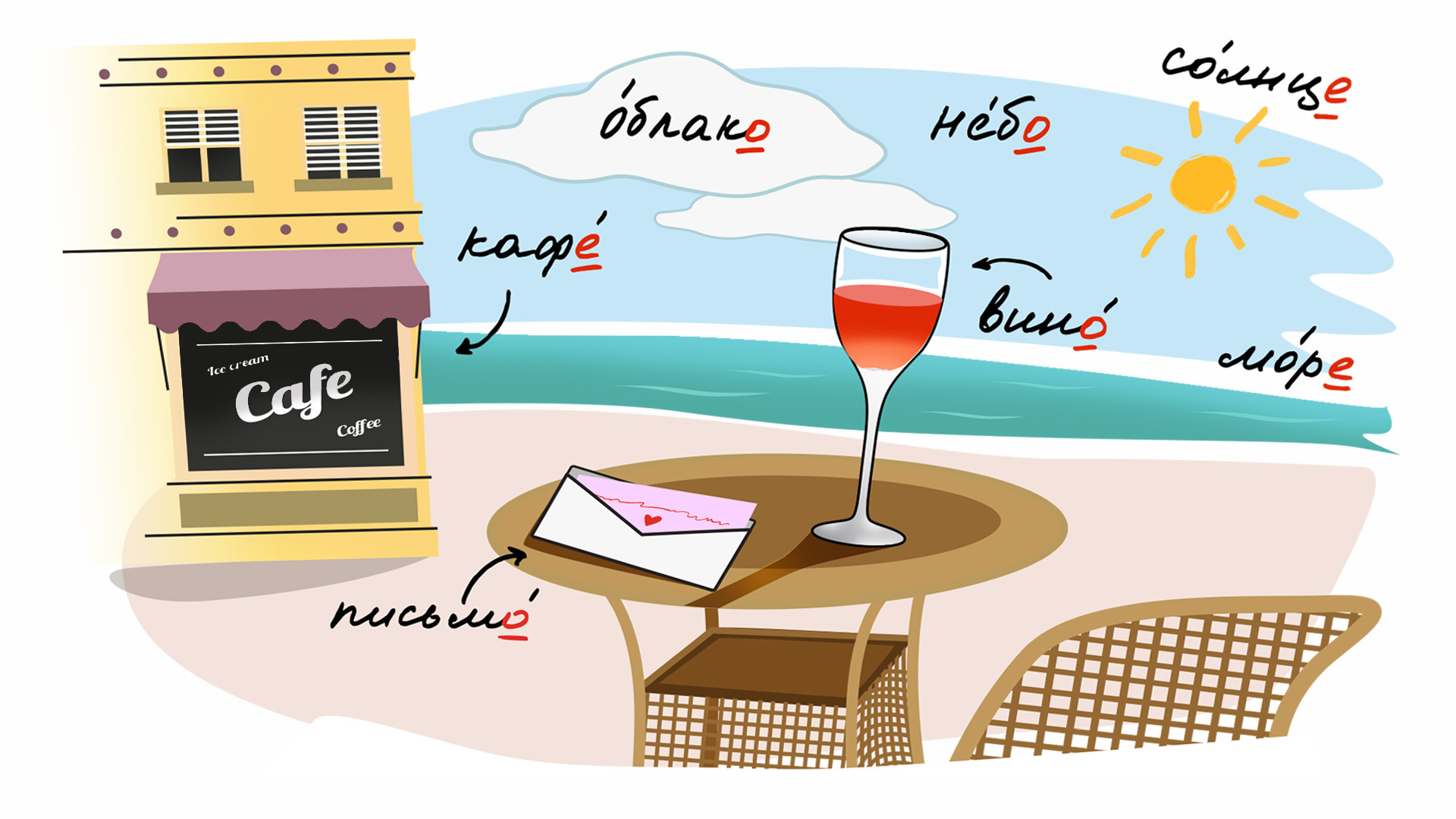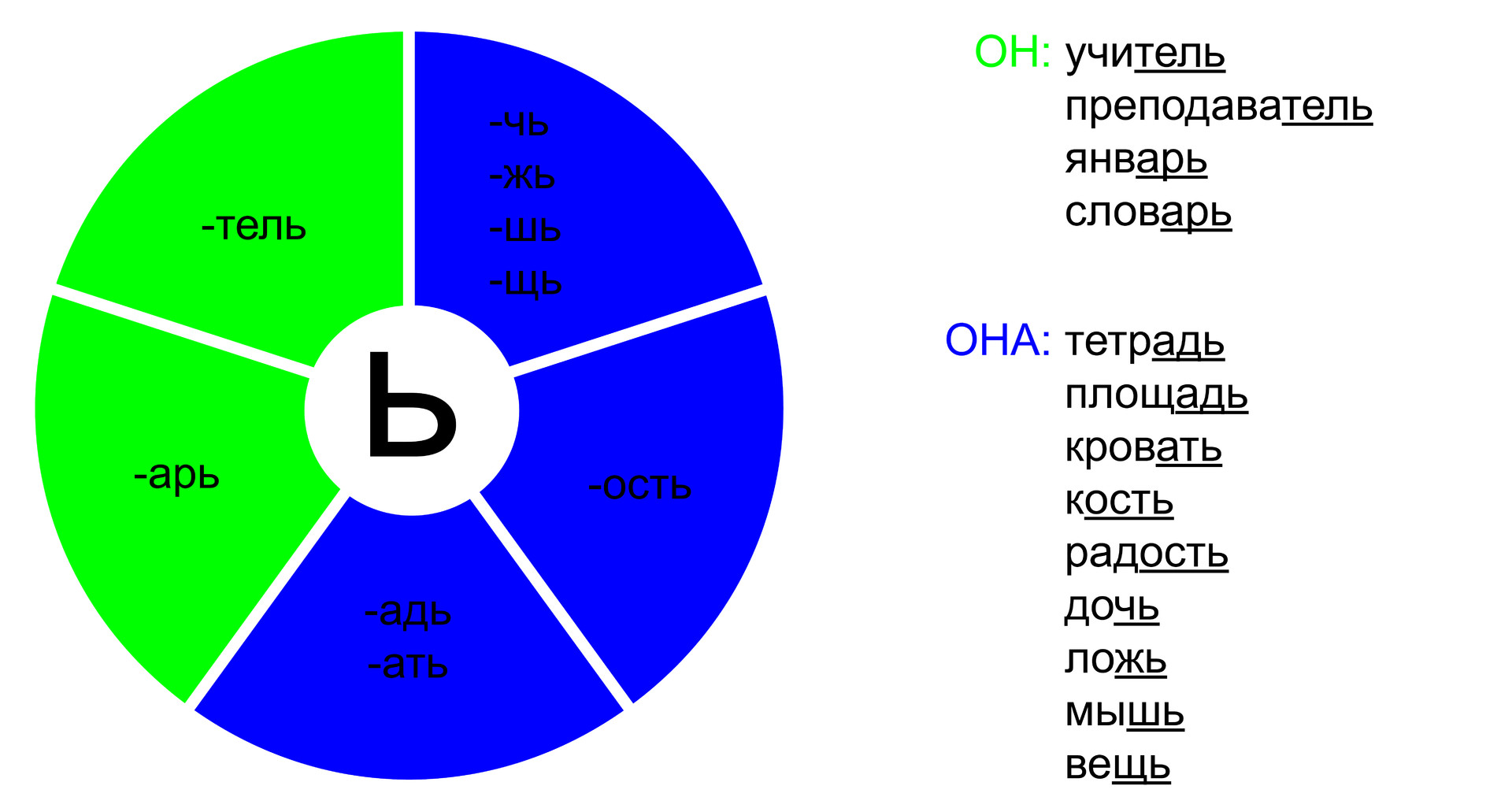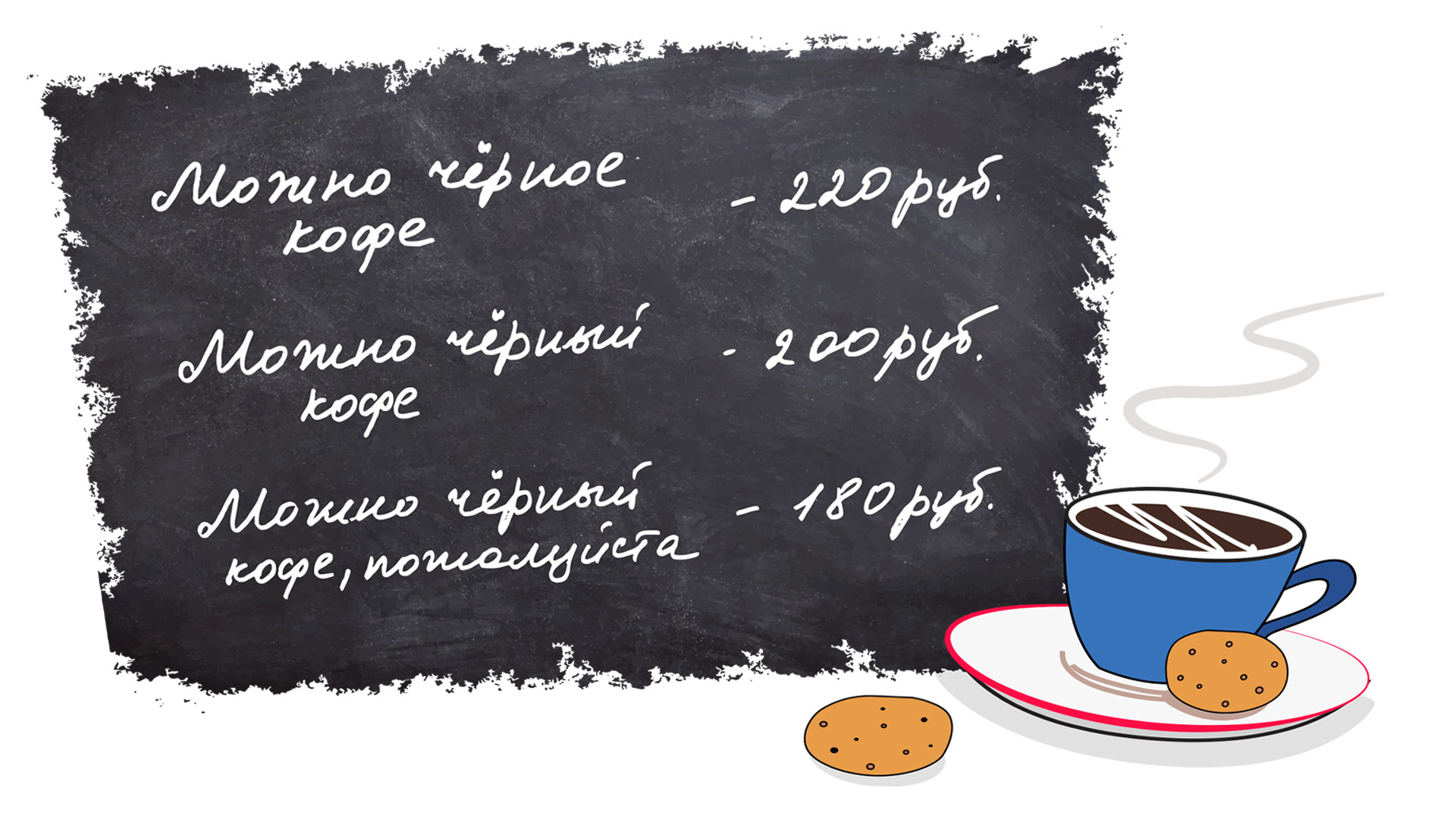Gender of Russian nouns.
In Russian, as with many other languages, each noun is assigned a gender. Russian has three genders: masculine, feminine, and neuter (neutral).
In the cases of words like “father” these relate to physical gender. In the case of other objects like “pen”, “cup”, “house”, there is no physical
meaning attached to the gender. However you will still need to know the gender because it affects how words are formed.
Luckily, unlike many languages, in Russian it is almost always possible to tell what the gender of a noun by it’s spelling.
This is not true in some other languages where you just have to memorise them.
When you use a noun as the subject of a sentence, it will be in it’s dictionary form (nominative case). In this form you can easily work out it’s gender.
If the noun is in another part of the sentence the ending is changed to suit the case. From the dictionary form of a noun, here is how you can tell
what the gender is:
1. Look at the last letter of the word:
2. If it is a consonant, or “й”, the word is masculine.
3. If it is “а” or “я” it is feminine.
4. If it is “о” or “е” it is neuter.
5. If it is a soft sign “ь” then it could be either masculine or feminine.
There are very few exceptions to these rules. But there are five notable exceptions, this occurs mainly because of physical gender.
Папа — (Daddy, Papa) — Is Masculine
Дядя — (Uncle) — Is Masculine
Дедушка — (Grandfather) — Is Masculine
Мужчина — (Man) — Is Masculine
Кофе — (Coffee) — Is Masculine
Some examples:
Masculine : паспорт (passport), документ (document), брат (brother), Хлеб (bread).
Feminine : газета (newspaper), Россия (Russia), Дочь (daughter)
Neuter : здание (building), радио (radio), письмо (letter)
Recommended Books For Learning Russian
Even though, in most cases, determining the gender of a word can be done with grammar, there are some words where you’ll simply have to memorize the rule.
Getting started with Russian grammar, students learn one simple rule during their first class: always look at the ending of a word — it’s where the answer lies. It will tell you, how to correctly change a given word and what role it will play in the sentence. Let’s look at nouns, for example.
All nouns in Russian are divided into three main groups: male (ОН), female (ОНА) and neutral (ОНО). Their gender is defined by the form — nominative case, singular. 90 percent of male nouns end with a hard or soft consonant, while the female ones end in А/Я and the neutral uses О/Е.
Table 1. Gendering nouns
Alena Repkina
It’s understood why the word мальчик (boy) is ОН, while девочка (girl) is ОНА — an elementary knowledge of biology comes in handy here. However, why is телефон (telephone) an ОН and a машина (car) is an ОНА? Biology is useless here, so we need to go to the rule book on this one. The rule can be memorized with the aid of simple stories and associations:
ОН — Ма́й 2022. У меня́ е́сть биле́т на самолёт. Ну́жен то́лько рюкза́к. А в нём компью́тер, клю́ч, телефо́н, и, коне́чно, па́спорт.
MALE — May 2022. I have a plane ticket. Need only a backpack. And in it my computer, keys, phone and, of course, my passport.
ОНА — Росси́я – моя́ страна́. Во́т доро́га, е́дет маши́на. В ней сиди́т моя́ семья́, плю́с на́ша ко́шка и на́ша соба́ка.
FEMALE — Russia is my country. Here is a road, a car is driving. There is my family in it, plus our cat and our dog.
ОНО — Сижу́ в кафе́. Пишу́ письмо́ и пью́ вино́. А рядом – со́лнце, не́бо, мо́ре, о́блако.
NEUTRAL — Sitting in a cafe. Writing a letter and drinking wine. And by me — the sun, the sky and clouds.
Knowing the gender, we can easily substitute a noun with a pronoun in simple dialogues:
1) — Ты не знаешь, где ключ? (Don’t you know where the key is?)
— Вот он! На столе. (Here it is! On the table.)
2) — Ты не знаешь, где кошка? (Don’t you know where the cat is?)
— Вот она! На диване. (Here it is! On the sofa.)
3) — Ты не знаешь, где кафе? (Don’t you know where the cafe is?)
— Вот оно! На пляже. (Here it is! On the beach.)
If the noun ends in a -Ь, other rules come into play: the word can be either male or female. Only a dictionary (or a Russian-speaking friend) will be able to help out with the correct answer. In any case, you’ll need to consult your long-term memory and apply gender characteristics when confronted with nouns that end in -Ь:
4) — Где тетрадь? (Where is the notebook?)
— Вот она! В сумке. (Here it is! In the bag.)
— А где словарь? (And where is the dictionary?)
— Вот он! На полке. (Here it is! On the shelf.)
However, you can find clues here, as well. Again, look at the endings. Nouns that end in -тель and -арь are always male, while the ones that end in -адь, -ать, -ость, -чь, -жь, -шь, -щь – are female.
A case exists with the word кофе. Until recently, an exception applied, and, despite its -Е ending, the word was male: — Где кофе? – Вот он! Consequently, the adjectives and everything else would also be male. Even Russians themselves found the exception incredibly annoying, always being tripped up by it and automatically using the neutral gender: Ммм, какое вкусное кофе! Оно лучшее! Ой, нет, он лучший, он вкусный!; the situation even became the subject of a satirical plaque in a St. Petersburg cafe:
Можно чёрное кофе – 220 рублей (Can I have a black coffee (neutral) — 220 rubles)
Можно чёрный кофе – 200 рублей (Can I have a black coffee (male) — 200 rubles)
Можно чёрный кофе, пожалуйста – 180 рублей. (Can I have a black coffee (male), please — 180 rubles)
However, as recently as a couple of years ago, the language was officially changed to include the usage of кофе in neutral, so as to avoid looking like an uncultured person when you inevitably make that “mistake”!
If using any of Russia Beyond’s content, partly or in full, always provide an active hyperlink to the original material.
Get the week’s best stories straight to your inbox
Gender is a grammatical category used in Russian for the classification of nouns, pronouns, adjectives and certain verb forms into three classes: masculine, feminine and neuter. This classification may be arbitrary or based on characteristics such as sex and animacy and it determines selection of grammatical forms and agreement with modifiers and referents.
Gender is mainly relevant for nouns, since it is an integral grammatical characteristic of each noun. Every noun belongs originally to one of the three classes (masculine, feminine or neuter) and each of these classes has its own grammatical features related to the words endings and forms of modifiers (adjectives, pronouns etc.). A noun keeps its grammatical gender in all of its forms and never changes it.
The vast majority of nouns in Russian have gender according to the ending of their citation form (nominative case form), given in the dictionary, and their meaning plays no role here. Thus, Russian nouns generally have specific word endings for masculine (generally, nouns ending in a hard consonant and -й), feminine (endings -a and -я) and neuter (endings -о and -е). In a small number of instances, however, gender-specific word endings do not conform to grammatical gender of nouns, or nouns may have no gender-specific endings. (See also: Gender of Russian nouns)
кофе cofee – this Russian word ends in -e which is an ending specific for neuter, but this word is grammatically masculine.
пенальти penalty kick — this Russian word ends in –и which is not a gender-specific ending, it is grammatically masculine.
As for animate nouns, their grammatical gender usually coincides with the biological gender of their referents. For example, the word брат brother is grammatically masculine and denotes a masculine person, the word мама mom is grammatically feminine and refers to a feminine person. However, in some cases, grammatical gender and biological gender do not coincide. It may happen, for instance, with some nouns denoting professions or occupations that are grammatically masculine, but may refer both to men and to women.
Мария архитектор. – Maria is an architect.
The word архитектор architect is masculine, but refers to a woman.
Мария моя новая коллега. – Maria is my new colleague.
In this phrase, the word коллега colleague refers to a woman, and, for this reason, its modifiers моя my and новая new are in the feminine form.
Николай мой новый коллега. – Nikolai is my new colleague.
In this phrase, the word коллега colleague refers to a man, and, for this reason, its modifiers мой my and новый new are in the feminine form.
In Russian, there is also a particular group of words called nouns of common gender. These are nouns ending in –a or –я (endings specific for feminine) that are used in a phrase either as masculine or as feminine depending on the biological gender of their referent.
In Russian, the grammatical gender of a noun may formally manifest itself inside the word (morphologically) through specific endings of singular forms in different cases (except indeclinable nouns), or outside the word (syntactically) through forms of its modifiers (adjectives, pronouns, ordinal numerals etc.). However, in plural, there are no gender-specific word endings or forms of modifiers.
For adjectives, pronouns, adjective-like words, and some verb forms (past-tense forms) grammatical gender is a category that shows in phrase the relationship between these words and the related noun in singular. These words have specific forms for masculine, feminine and neuter, and the choice of a gender-specific form will depend on the grammatical gender of the noun they modify or refer to. To put it differently, adjectives, pronouns, adjective-like words, and some verb forms express in singular the same gender as the noun, generally by adding a special ending for masculine, feminine and neuter. Notice that in plural these words will have the same endings for all genders.
Это была интересная книга. – It was an interesting book.
The verb была was and the adjective интересная interesting have gender specific endings (-a for the verb and –ая for the adjective), because they refer to the feminine noun книга.
Это был интересный фильм. – It was an interesting film.
The verb был was and the adjective интересный interesting have gender specific endings (no ending or zero ending for the verb and –ый for the adjective), because they refer to the masculine noun фильм film.
Это былo интересное представление. – It was an interesting performance.
The verb былo was and the adjective интересное interesting have gender specific endings (-о for the verb and –ое for the adjective), because they refer to the neuter noun представление performance.
BUT!
Это были интересные книги. – These were interesting books.
Это были интересные фильмы. – These were interesting films.
Это были интересные представления. – These were interesting performances.
In all phrases, verbs and adjectives are in plural and have the same endings (-и for the verbs and –ые for the adjectives), whichever the gender of nouns is.
Summary:
-
There are three genders in Russian: masculine, feminine and neuter, and all Russian nouns have gender.
- In the vast majority of instances, the grammatical gender of a noun may be determined by its ending of the form given in dictionaries (citation form).
- The grammatical gender of animate nouns and the biological gender of their referents usually coincide. However, they may be different, like in nouns denoting professions or nouns of common gender.
- The grammatical gender of Russian nouns manifests itself in singular forms of different cases, not in plural, and it determines the endings of adjectives, pronouns, adjective-like words and past-tense forms of verbs in a phrase.
Like several other foreign languages, Russian is a gendered language. What does that mean? If this is your first time learning a gendered language, this means that every single noun (people, places, and things) has a preassigned gender. Nouns in Russian are either masculine, feminine, or neuter, and, for the most part, do not correspond to the meaning of the noun. Rather, the gender of Russian nouns is determined by the noun’s ending in the nominative case. Luckily, in Russian, there are only a few exceptions to this rule, so it is a relatively clear-cut process to determine a noun’s gender. So, let’s dive into nouns and gender in Russian!
Want to learn more about the basics of Russian? Check out the rest of my Russian Basics articles!
Why is gender important to learn?
Why is it important to learn about Russian gendered nouns? It is necessary to know the gender of a noun for 2 main reasons:
- Any parts of speech that modify a noun must match the gender of that noun.
Ex. Adjectives – Adjectives do not have an intrinsic gender, rather they are changed to match the gender of the nouns they are modifying/describing.
Let’s say you want to describe your home. The word for home in Russian is “дом.” Because the word ends in a consonant (see below for a chart of all endings), the word “дом” is masculine. Therefore, if we want to describe the house using an adjective — let’s say we want to say “yellow house” — the adjective, “yellow,” must also be masculine. Therefore, “yellow house” is “жёлтый дом”.
Now, let’s say we have a noun that is feminine, for example “кошка,” which means “cat.” If we want to say “yellow cat,” we use the same adjective meaning “yellow,” however, we change the ending of the adjective, not the noun. So, we change the masculine adj. жёлтый → feminine adj. жёлтая. They have the same meaning, but one is used with masculine nouns and the other with feminine nouns.
- The endings of the nouns can change in different cases depending on its gender.
If you are unaware of the case system in Russian, check out my study guide on the Russian Case System. The case system and its functions dictate spelling changes that are based upon the gender of nouns.
Russian Noun Endings by Gender
Before you get too overwhelmed (I definitely was at first, so don’t sweat it), it’s not totally a guessing game when it comes to the relationship between a word and its gender. As mentioned above, a noun’s gender correlates to its ending, so let’s start there!

Gender in Russian Exceptions
If there is one thing I appreciate in a language, it is consistency in its rules. The majority of Russian is very consistent in this regard, however, like every language, even Russian has its exceptions. Below are 3 exceptions to the rule that gender is determined by a noun’s ending.
- For some words, gender is dictated by its meaning rather than its ending — This is the case for several masculine words that end in -а & -я, and whose meanings correspond to traditionally masculine family members.
- Папа (м) – Dad
- Дедушка (м) – Grandpa
- Дядя (м) – Uncle
- “Imported” words”— Imported words are words that are derived from a foreign language. These words vary in gender, however, they are all indeclinable. This means that they only have the one form, and they do not decline – regardless of number or case.
- Саля́ми (ж) – Salami
- Торна́до (м) – Tornado
- Кака́о – Cocoa
- Меню́ – Menu
- Резюме́ – Resume, CV
- Такси́ (ср) – Taxi
- Шоу (ср) – Show
- Ко́фе (м) – Coffee
- Common gender nouns— For most nouns in Russian that describe people (occupation, general qualities etc.) the endings vary slightly if you are describing a man or a woman. For example: waiter (официант и официантка), teacher (учитель и учительница), singer (певец и певица). Common gender nouns, however, can refer to both men and women alike.
- У́мница – Smart person
- Сирота́ – Orphan
- Колле́га – Colleague
- Неря́ха – Slob, mess
- Обжо́ра – Glutton
- Со́ня – Sleepyhead
- Неве́жа – Impolite, rude person
- Неве́жда – Ignoramus
Additional Resources on Nouns and Gender in Russian
Check out these websites and videos below for some extra Russian help!
- Russian Lessons.net – Gender in Russian
- Master Russian – Noun Gender and Number
In need of a better way to organize your language notes? Check out my planner below!
Lesson 007
Russian grammar:
Gender in Russian
One of the main differences between Russian and English is the fact that every Russian noun belongs to one of the 3 genders: masculine, feminine or neuter.
Knowing the gender of a noun is important as it affects the endings the noun takes in different cases.
It’s quite easy to figure out the gender when we are talking about people, but what to do when the noun is inanimate? The answer is: look at the word’s ending.
Feminine nouns
The feminine nouns end in -А, -Я or -Ь.
Examples:
– кни́га [knée-ga] – book
– неде́ля [nee-dyé-lya] – week
– ночь [noch’] – night
Neuter nouns
The neuter nouns end in -O, -Е. Examples:
– о́блако [ób-la-ka] – cloud
– зна́ние [zná-nee-ye] – knowledge
– со́лнце [són-tse] – sun
Masculine nouns
The masculine nouns often have no ending, i.e. the last letter is a consonant. Sometimes they end on -Ь (as the feminine nouns, do not get confused). Examples:
– день [dyen’] – day
– год [got] – year
Exceptions
There is also a number of exceptions. For example, some words are masculine despite their endings:
– пáпа [pá-pa] – dad
– дя́дя [dyá-dya] – uncle
– ко́фе [kó-fye] – coffee
These words are neuter despite ending in -Я:
– вре́мя [vryé-mya] – time
– и́мя [ée-mya] – name
Some words can be masculine and feminine at the same time:
– колле́га [kal-lyé-ga] – colleague
– копу́ша [ka-pú-sha] – slowpoke
Now, you are familiar with the gender in Russian and know how to determine a gender of a Russian noun. Practice all these words with the audio recording. And come back to learn Russian in the next lesson!
The offline version of this lesson is available here
Start the quiz
-
What gender:
гру́ша (pear)
- masculine
- feminine
- neuter
Answered: 0 out of 10
Correct answers: 0 (0%)
Next
-
- masculine
- feminine
- neuter
Answered: 0 out of 10
Correct answers: 0 (0%)
Next
-
What gender:
де́рево (tree)
- masculine
- feminine
- neuter
Answered: 0 out of 10
Correct answers: 0 (0%)
Next
-
What gender:
со́лнце (sun)
- masculine
- feminine
- neuter
Answered: 0 out of 10
Correct answers: 0 (0%)
Next
-
What gender:
телеви́зор (TV set)
- masculine
- feminine
- neuter
Answered: 0 out of 10
Correct answers: 0 (0%)
Next
-
What gender:
стена́ (wall)
- masculine
- feminine
- neuter
Answered: 0 out of 10
Correct answers: 0 (0%)
Next
-
What gender:
журна́л (magazine)
- masculine
- feminine
- neuter
Answered: 0 out of 10
Correct answers: 0 (0%)
Next
-
What gender:
по́мощь (help)
- masculine
- feminine
- neuter
Answered: 0 out of 10
Correct answers: 0 (0%)
Next
-
- masculine
- feminine
- neuter
Answered: 0 out of 10
Correct answers: 0 (0%)
Next
-
What gender:
но́мер (number)
- masculine
- feminine
- neuter
Answered: 0 out of 10
Correct answers: 0 (0%)



